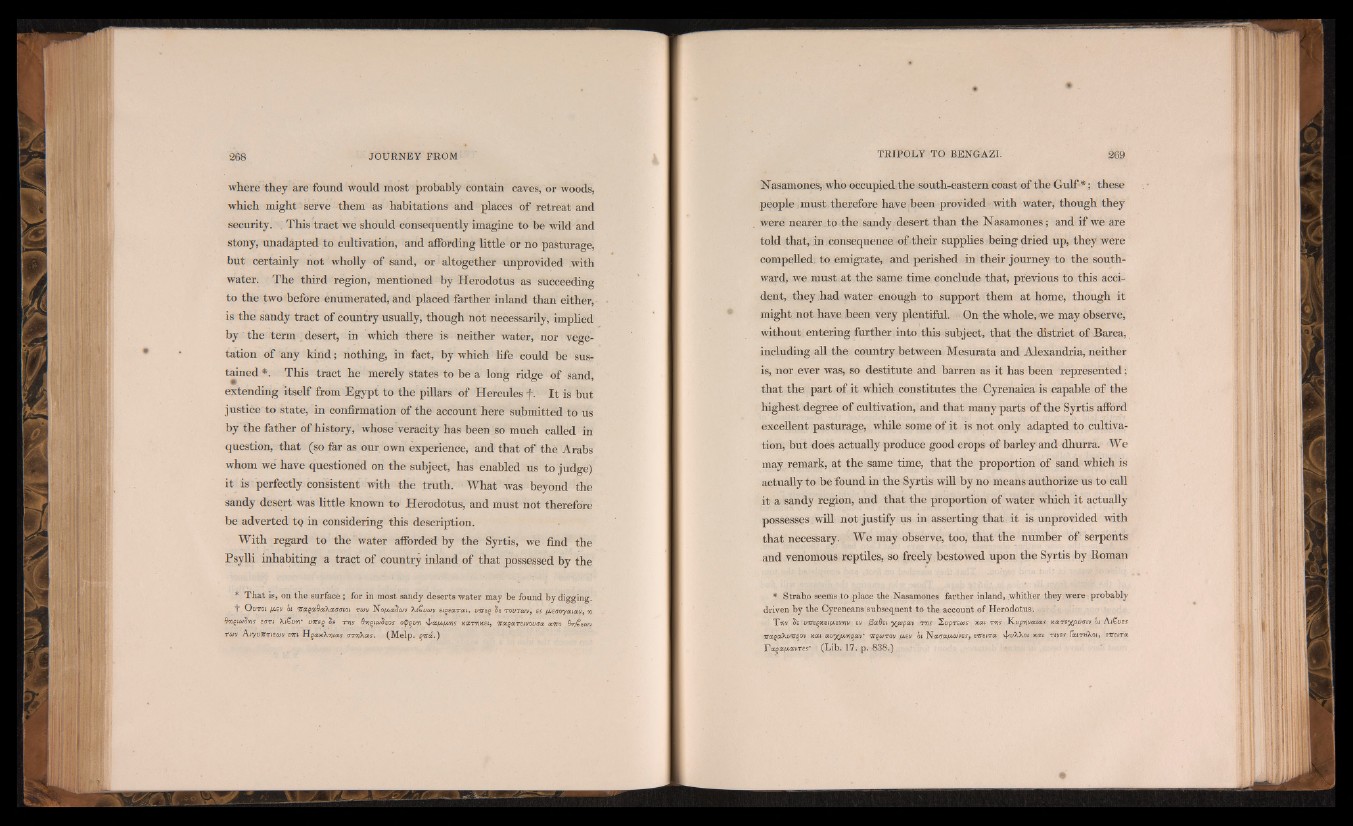
where they are found would most probably contain caves, or woods,
which might serve them as habitations and places of retreat and
security. , This tract we should consequently imagine to be wild and
stony, un adapted to cultivation, and affording little or no pasturage,
but certainly not wholly of sand, or altogether unprovided with
water. The third region, mentioned by Herodotus as succeeding
to the two before enumerated, and placed farther inland than either,-
is the sandy tract of country usually, though not necessarily, implied
by the term desert, in which there is neither water, nor vegetation
of any kind ; nothing, in fact, by which life could be sustained
*. This tract he merely states to be a long ridge of sand,
extending itself from Egypt to the pillars of Hercules f. I t is but
justice to state, in confirmation of the account here submitted to us
by the father of history, whose veracity has been so much called in
question, that (so far as our own experience, and that of thè Arabs
whom we have questioned on the subject, has enabled us to judge)
it is perfectly consistent with the truth. What was beyond the
sandy desert was little known to Herodotus, and must not therefore
be adverted tQ in considering this description.
With regard to the water afforded by the Syrtis, we find the
Psylli inhabiting a tract of country inland of that possessed by the
* That is, on the surface ; for in most sandy deserts water may be found by digging.
1. Our01 ¡asy Si ysagaQakaqoiot ron No/Aa:5cdv XiCuwv EigexTxi. vsssq 5s rouTtov, ss faeaoyaiay^ n
0agi«5yr sari XiCva' oweg 5s ms SagiaiSsoy otpgvn ^a/afMis xamxsi, stagarsiyovaa asso QsiGscov
Tm Aiyusmsm ssli HgaxXwar ffraXar. (Melp.. gffa.)
Nasamones, who occupied the south-eastern coast of the Gulf * ; these
people , must therefore have been provided with water, though they
were nearer to the sandy desert than the Nasamones ; and if we are
told that, in consequence iof their supplies being dried up, they were
compelled, to emigrate, and perished in their journey to the southward,
we must at the same time conclude that, previous to this accident,
they had water enough to support them at home, though it
might not have been very plentiful. On thè whole,-we may observe,
without entering further into this subject, that the district of Barca,
including all the country between Mesurata and Alexandria, neither
is, nor ever was, so destitute and barren as it has been represented ;
that the part of it which constitutes the Cyrenaica is capable of the
highest degree of cultivation, and that many parts of the Syrtis afford
excellent pasturage, while some of it is not only adapted to cultivation,
but does actually produce good crops of barley and dhurra. We
may remark, at the same time, that the proportion of sand which is
actually to be found in the Syrtis will by no means authorize us to call
it a sandy region, and that the proportion of water which it actually
possesses will not justify us in asserting that it is unprovided with
that necessary. We may observe, too, that the number of serpents
and venomous reptiles, so freely bestowed upon the Syrtis by Roman
* Strabo seems to place the NasamoneB farther inland, whither they were probably
driven by the Cyreneans Subsequent, to the account .of.Herodotus.
TriV 5e vasqueitasysìv ev /3a0et yfljpav m s sZvprscos xai m s Ki/p iv aiar xarsypvoiy ói AiCt/er
wagosXusrgov xai a v y jm ^a y ' srqturov [xev hi Nacrapw/Ver, estsira J/aXXoi xai rivsr JairaXoi, eslsiva
Taga/Aavres' (Lib. 17. p. 838.)